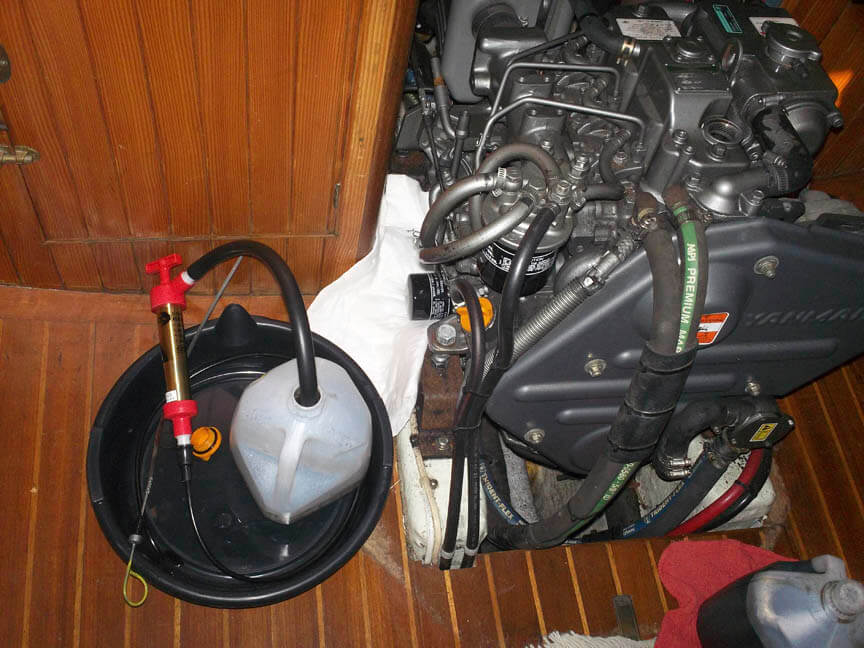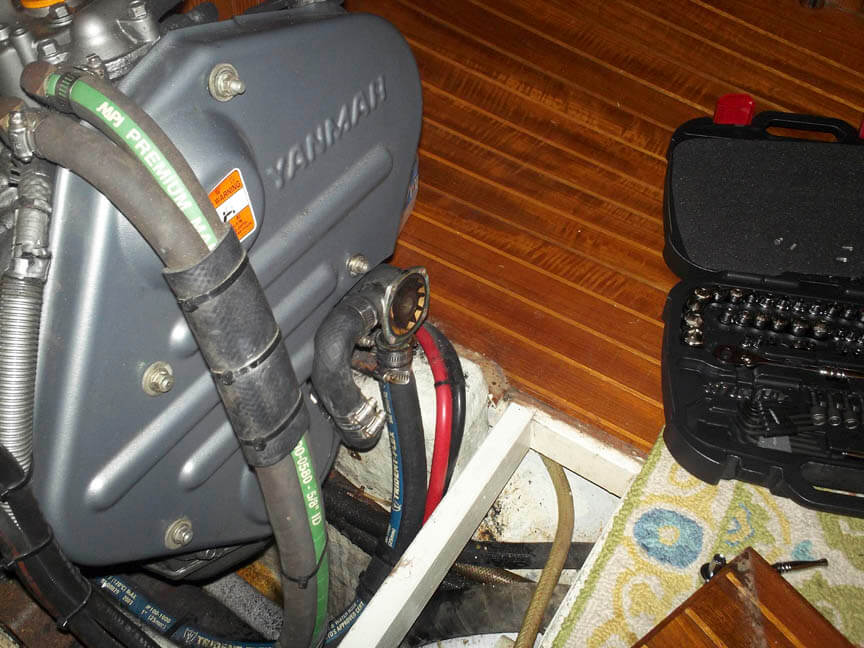Even before we bought Bear, Margaret and I had discussed how we needed to take a marine diesel course. Neither of us had much of any experience with diesel engines beyond encountering a few issues during a charter. Once we became boat owners, we recognized that our Yanmar was the single most expensive piece of equipment and that performing preventative maintenance would be the best way to protect that investment. But, because of limited time and money, this past spring we did little more than look into the marine diesel course offerings across the country. Consequently, we went into our first summer aboard Bear hoping for the best and committed to trying to understand the diesel and get comfortable performing basic maintenance on it.
As the summer progressed, we did just that, slowly learning about our Yanmar as issues arose. It was almost as if the engine was indoctrinating us at a demanding, but not unreasonable, pace. Early on, we needed to tighten the alternator belt, which, after some research and hesitant action, we accomplished without a problem. Later, we managed to change the oil and filter after our first hundred hours of operation. Sometime after that, we actually replaced the alternator belt and figured out how to keep it from slipping again. By the time we sailed into Solomons, Maryland, halfway through our summer, we were had learned the first name of our engine, identifying it as a 3JH4E when we ordered spare parts at Zahnisers Yachting Center (and they kindly shipped them to us further down the ICW). Then, nearing the end of our trip, I needed to troubleshoot the raw water system, eventually replacing the impeller. By the time we were winterizing the boat, I felt comfortable enough to do the bulk of it myself.
Even with our summer-long education, Margaret and I still realize we have a lot more to learn about diesel engines. And, we do not want to wait until another problem arises to nervously fumble our way through the learning process. So, we are once again researching marine diesel courses and, this time, making plans to take one before we are back aboard in the spring. Below are some of the courses we have found along with details, links, and any additional information we might have about the course.
Mack Boring – This Yanmar dealer offered 1-3 day courses for some time. While the company is based in New Jersey, they held courses in a few different locations across the country, including Chicago. Most cruisers who had been through the curriculum, which includes hands-on instruction on a Yanmar model of your choice, highly recommended these courses despite the high sticker price ($900 for the three-day variety). Unfortunately, Mack Boring stopped offering these courses this past summer. Rumor has it that the instructor, Larry, retired. Hopefully Mack Boring will resume these courses in the future, but currently the pages related to instruction on their website all return “file not found,” which does not hold out a lot of promise.
Annapolis School of Seamanship – With a host of courses covering everything from weather to marine electronics, Annapolis School of Seamanship is a well-established source of instruction for sailors. They offer a two-day hands-on basic marine diesel course for $395 and a more advanced “Level II” course for $495. Both look excellent, and I have been unable to find anything but glowing reviews. Indeed, a couple we met this summer had taken the introductory course and encouraged us to follow in their footsteps. It seems likely that I will end up taking the two-course sequence from these guys.
WoodenBoat School – Most cruisers have heard of WoodenBoat, “the magazine for wooden boat owners, builders and designers” that always includes some jaw-dropping photographs of beautiful wooden craft, interesting stories about maritime history, and a lot of other material geared towards wooden boat owners and aficionados. What you might not know is that they also offer dozens of courses on cool topics like rigging, boatbuilding, and even painting. Their 750 dollar weeklong marine diesel course looks to be intense and comprehensive and gets solid reviews from former students. Unfortunately for us, their courses are only held during the summer, which is exactly when we would rather be on Bear than sitting in a classroom. Otherwise, I think I would take this course in Brooklin, Maine, especially because housing is available on site.
The three courses above are the most consistently recommended by cruisers on the web. However, there are a number of other options that you might want to check out before jumping on one of these courses in Maine, Maryland, or New Jersey.
Most community colleges and technical schools offer diesel courses, though not necessarily marine diesel courses. Still, these will teach you diesel maintenance, troubleshooting, and repair, which should all be easily transferable to your smaller and simpler boat engine. Moreover, the tuition for these courses is often lower than the cost of those listed above, not to mention the money you will save by not having to pay for travel and lodging.
Some yacht clubs, community sailing centers, and marinas also offer marine diesel courses occasionally. For instance, relatively close to us, Rentner Marine in Chicago held an evening seminar early this past spring, open to anyone for a nominal cost. In my previous search for courses, I had come across a more in-depth session through a sailing club just outside Los Angeles. Searching the internet, making a few calls, and getting the word out to your sailing friends that you are looking for a course in your area might turn up something. Along these lines, you should also check in with your local United States Power Squadron as they often hold marine diesel courses. Even if your local squadron does not, they might very well know of a nearby course.
I am going to continue to look into different marine diesel options. I will be sure to post an update if I find any new information. And I will certainly provide a comprehensive review of our experience when we finally attend a course.



Just read your article and think we are in the same boat, pun in tended, as you. We’d like to be able to perform routine engine maintenance on our Ranger Tug R27 with a Volvo/Penta 200 D3 engine. Any Volvo/Penta course recommendations would be appreciated. Thanks. Ray & Pam